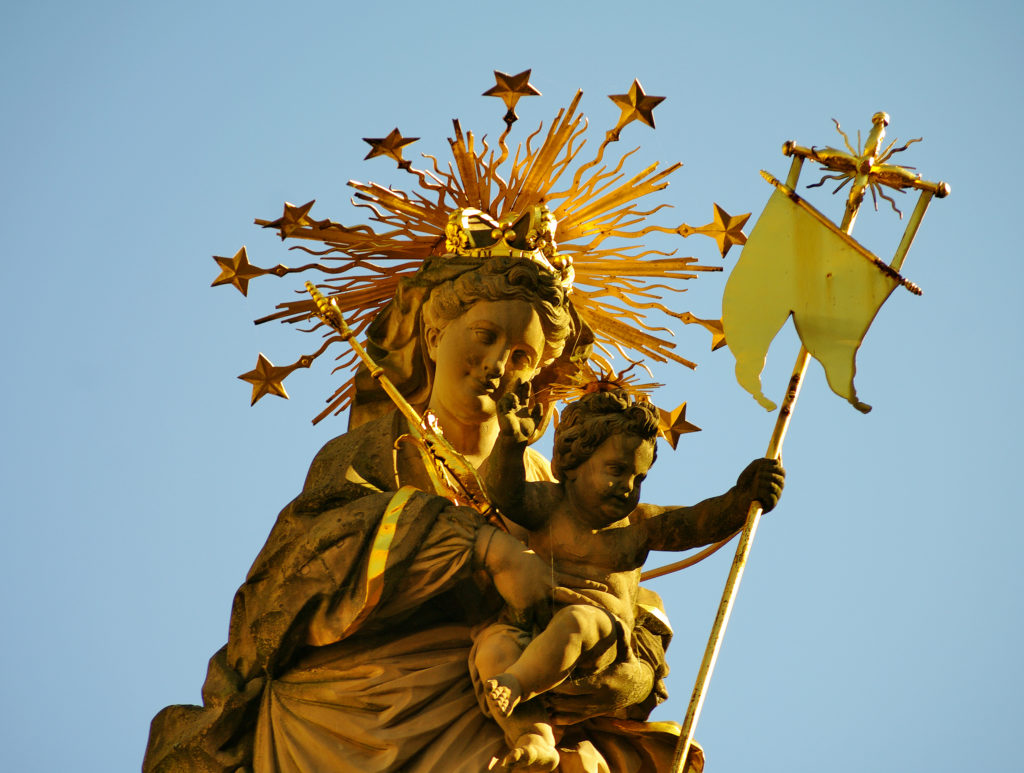
Published May 6, 2022
This interview with Larissa Porzelt was conducted by EPPC Fellow Jennifer S. Bryson. Larissa Porzelt, from Germany, is a student of theology at Hochschule Heiligenkreuz in Austria. This interview was originally conducted in German and was translated into English by Jennifer S. Bryson. The German version of this interview will appear in the May 2022 edition of the Austrian Catholic magazine Vision 2000.
Note: “Maria” is the German name for Mary.
Jennifer Bryson: You are involved in Maria 1.0. But first, what is Maria 2.0?
Larissa Porzelt: Maria 2.0 is an initiative that was founded in 2019. This initiative aimed for a strike and protests as well as renewal of the Church by making the ministries accessible to everyone, abolishing celibacy, labeling the Church’s sexual morality unrealistic and discriminatory, and presenting clericalism as the Church’s fundamental problem, as the cause of sexual abuse. Most recently, these arguments were presented in the media last year by posting these theses, to call for a discussion within the Church.
It is also worth mentioning that the founders of Maria 2.0, Elisabeth Kötter and Andrea Voß-Frick from Münster, left the Catholic Church last year. Now, of course, the question arises: how does one want to reform a church if one is no longer part of it or no longer wants to be part of it?
What is Maria 1.0?
Maria 1.0 – Mary doesn’t need an update! (as our tagline says) – began as a counter-initiative to Maria 2.0; both started in May 2019. However, Maria 1.0 has expanded and we are now looking into covering all theological issues and we want to preserve the treasure of the Church’s Tradition. In May 2021, our founder Johanna Stöhr handed over her leadership to Clara Steinbrecher, a student [at the Catholic university] in Eichstatt.
Our motto is this: Marian, eucharistic, loyal to the Pope, and Catholic.
We are an association of German Catholic women who are making public our unity and loyalty to the Catholic Church and the Magisterium. Maria 1.0 is characterized by a variety of spiritualities, and we emphasize the classical apostolate of prayer and lay outreach. Also, we have a presence on social media (Instagram and Facebook), to evangelize – a particular concern of ours – and proclaim the faith in a modern way. For the future, Maria 1.0 is planning theological conferences, as well as a way for Catholics in German-speaking areas to create a good network for communication.
What are some of Maria 1.0’s main criticisms of Maria 2.0?
Mary 1.0 criticizes the supposed reform of the renewal of the Church, while ignoring the three pillars of the Church. Tradition, Holy Scripture, and the Magisterium have no place in this organization. Moreover, the holy ever-virgin Mother of God is being misused for their purposes. This is why we have the tagline: Mary doesn’t need an update!
We believe that this initiative has alienated itself from the essence of the Church, detaching itself from her divine order to carry out their own ideology of feminism. In doing so, we distance ourselves from them and consider it pointless, superfluous, and theologically wrong to conduct a nationwide strike against the essence of the Church.
Who is involved in Maria 1.0?
We are predominantly young German Catholic women who have come together from all walks of life, whether we are housewives, students, workers, or academics, to show our love for the Church and the Blessed Mother.
The German Church is known for being very liberal, sometimes even unrecognizably liberal. How did you manage to avoid swimming along with this current?
I fled from Germany to Austria! But all joking aside: After my conversion at the end of 2016, a day before my nineteenth birthday, I received the grace of God to start my theology and philosophy studies in Heiligenkreuz in a good conservative environment. Besides, my nature is such that I like to be informed and I want to know God more and more. This simply brought out certain questions in me: what is truth? Where is this truth to be found? What really constitutes the Church?
Ultimately, it has been crucial for me to recognize that God instituted the One Holy Catholic and Apostolic Church through His Son and we are not empowered to make our own doctrine for her by omitting or adding, or by simply inventing traditions.
Why did you decide to support Maria 1.0?
I don’t want to study theology and philosophy only for myself, rather I also want to live my faith and pass it on. In doing so, it has been important to me to find something that is, first, in a community and, second, truly Catholic. My personal motto is, “All-in or not at all.” Maria 1.0 stands completely behind and for the Church, even when the Church is, of course, not perfect.
What criticism have you received for your involvement in Maria 1.0?
Several times a week one gets verbally attacked for one’s attitude and loyalty to the Church. The same arguments are almost always used, that one has no opinion of one’s own, that one is oppressed by a patriarchal system, and that it’s as if I were living in the Middle Ages.
What is your role in Maria 1.0?
I am a volunteer for social media outreach. We are primarily available via our website and we have Instagram, Facebook, and Twitter accounts. Of these, I’m in charge of Twitter. There are also individual and varied tasks that one can do depending on one’s own time commitment. These can include creating social media posts, writing summaries of specific events within the Church, or conducting interviews.
What role is Maria 1.0 playing in the German “Synodal Way”?
At the synodal meetings we have a representative directly on site who speaks up for the teachings of the Church. We have already written different articles, done print interviews, radio reports, and TV interviews to warn precisely about the erroneous path of the Synodal Way and to point out again and again that the true Church will not “save” the Church through her own reforms or changes in the Magisterium, but only by a return to God, Tradition, Scripture, and doctrine itself.
Maria 1.0 is about Mary. What is your favorite Marian feast day or devotion, and why is it of particular significance for you?
I love the Feast of the Immaculate Conception on December 8, the Solemnity of the Virgin and Mother of God conceived without original sin. She is fully human, and full of grace. She is the woman of the Church and has been exempted from the original debt. What God has done in and through her is amazing. This also shows me the incredible love and providence of God to give birth to His only Son through a human being and to entrust Him to her – a woman! Also: In December 2016, Our Lady converted me through the Rosary.
Imagine: you get to invite three saints to lunch and ask them for advice for Maria 1.0. Whom would you invite and what would you ask them?
I would invite the Church Father St. Augustine because he is the first Church Father I encountered, and he laid an incredible foundation for the development of the Church and in my life. My question would be how he would deal today with the bishops of the German Synod who are so obviously turning away from the Church and to what extent we still have to be obedient to them.
Further, I would invite the Holy Doctor of the Church St. Catherine of Siena and ask about her firm language, about how she was able to persuade Pope Gregory XI to go back to Rome. So I would hope to receive language from her that could bring the German bishops to their senses.
Lastly, I would ask Venerable Bishop Fulton J. Sheen how to use humor, composure, patience, and calm to guide the Catholics in Germany back onto the right path.
Jennifer Bryson, Ph.D., is a Fellow at the Ethics and Public Policy Center in Washington, DC and a Visiting Researcher at Hochschule Heiligenkreuz. She lives in Heiligenkreuz.
Jennifer Bryson, Ph.D., is a Fellow in EPPC’s Catholic Women’s Forum. Currently, she is translating the works of Ida Friederike Görres (1901-1971) from German to English while in residence at the Pope Benedict XVI Philosophical-Theological Institute, known as Hochschule Heiligenkreuz, in Austria.











